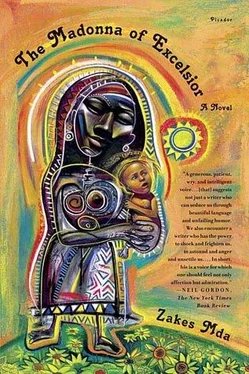Some of Niki’s hives were placed in clusters. Four hives to each cluster. Back to back and facing in different directions. Four different colours in each cluster. Red, blue, yellow and green. In the three-kilometre stretch, there were thirty hives.
At the farm, without the knowledge of the farmer, Niki had learnt from the labourers how to construct beehives. Each hive had a honey chamber and a brood chamber. Each chamber had ten frames on which honeycombs hung. In the brood chamber of each hive were the queen and the drones and the eggs and the brood.
Every morning Niki took her white garden chair and a piece of bread wrapped in plastic, and walked the six kilometres from Mahlatswetsa Location through the town to the bluegum trees. There she sat among the hives for the whole day. Listening to the buzzing of the bees. Watching the worker bees doing their work. Sitting still even as some of the bees danced around her, communicating calming messages to her through their airborne hormones. It was as if she shared the same pheromones with the bees.
Whenever she harvested some of the hives, Niki gave the honey away.
The message would be relayed from one mouth to the next: The Bee Woman has honey . We would then walk along the road as if we were on a particular journey. We would see her sitting on the chair among the hives, and would greet her in the sweetest of voices. She would call us to come and get some honey. She would give us honeycombs from the pile in a white plastic bucket in front of her. She did not wonder why we happened to have containers — empty billycans and pots — on our journey. Or why our journey suddenly came to an end and we turned back to the township as soon as she had given us the honey.
Her misguided generosity did not sit well with Viliki, who had helped her with the material to construct the hives in the first place. He had also assisted her with the construction of the catch-boxes that were used to trap swarming bees. Right from the beginning, as the councillor in charge of the parks, he had allowed her to place the hives in the veld near the trees that lined the road. He had even sent her to the farm at Ficksburg to learn more scientific ways of bee-keeping, while Popi was insisting that her mother be left alone to keep bees in her own way, using the wisdom that her ancestors had given her. Clearly her ancestors were talking to her through the bees, and it would be interfering with this communication if she were taught European ways of keeping bees, Popi had reasoned. Viliki had gone to all this trouble because he hoped that Niki would be able to make a living from the bees. Not just give honey away to passers-by.
Viliki once discussed his concerns with Adam de Vries, who went to offer his assistance to Niki.
“I can help you to expand your bee-keeping enterprise and make it financially viable,” he had said.
Niki had thanked him for the offer, but had made it clear that she did not need anyone’s assistance.
Even on Christmas Day Niki sat among the bees. And Popi sat on the bed in her mother’s shack. She was getting bored with the postcards. She could not go to the library on Christmas Day. It was closed. Nor could she go to collect cow-dung. In any event, cow-dung gathering expeditions were only enjoyable when Niki was there. Popi decided to get into the Christmas rickshaw, to sit behind Baby Jesus and Mother Mary, and ride along the dusty road of Mahlatswetsa Location, until it joined the broad tarred road that led to the town, past the closed shops and banks, right up to the stretch of road that was lined with bluegum trees. There she found Niki sitting on her garden chair among the hives.
Niki was pleased to see her daughter. She was always happy when Popi came to visit her. To pay homage to her, as Popi put it. We observed that the motlopotlo that existed between them was very strong. The motiopotlo was the invisible cord that tied the child to the mother. It was the umbilical cord that remained strong even after it had been cut and buried in the ash-heap after the birth of the child. Some mothers were fortunate in that the motlopotlo between them and their children remained strong throughout their lives. The less fortunate mothers had a weak motlopotlo. Their children forgot all about them and disappeared from their lives.
Popi sat on the grass at Niki’s feet. There was silence between them for some time. Then suddenly Niki said, “I did many wrong things in my life.”
“I don’t care what you did in your life, Niki,” said Popi quietly. “I don’t want to know.”
“Yet some of them have had a sweet harvest,” continued Niki, as if she had not heard her. “If I had not done what I did, you would not be here.”
Popi did not try to make sense of what Niki was saying.
“Are you still angry with Tjaart?” Niki asked.
“I do not want to be angry with Tjaart. I do not want to be angry with anyone.”
“At least now you do admit that you have some anger in you.”
“I told you, I react to his anger. I become angry at his anger. Perhaps I have gone overboard with my anger. Perhaps when the people of Mahlatswetsa made me angry by calling me names, I took it out on him.”
“Remember, my child, anger eats the owner.”
This sounded very much like the message that Jacomina and her father were trying to transmit to Tjaart Cronje. If Popi had ridden her Christmas rickshaw to the Cronje household, she would have found Cornelia Cronje, Tjaart Cronje, Jacomina Cronje and the Reverend François Bornman sitting on the veranda, enjoying their coffee and brandy after a lunch of roast quail with berry sauce, and trying to talk Tjaart Cronje out of his anger.
As usual Cornelia was fussing over Tjaart, to the annoyance of Jacomina. Cornelia always fussed over Tjaart as if he was a child. Did you have enough, Tjaart? Don’t you want another piece of this. or that? It irritated Jacomina even more that Tjaart allowed himself to become a baby whenever Cornelia was around. Is Tjaart warm enough?. Don’t allow him to go out in the cold like that, Jacomina. Did Tjaart eat before he left. Oh, my child this. my child that!
Jacomina had once complained: “You won’t be there to pick up the pieces when Tjaart gets thoroughly spoilt, Cornelia.”
She called her mother-in-law Cornelia, as she had always done before she married her son.
Cornelia Cronje had mumbled something to the effect that Jacomina did not know how to look after a man properly. That was why her first husband had left.
“I heard that,” Jacomina had screamed.
Cornelia kept silent as Jacomina and the dominee discussed her son’s anger. It was not doing him any good, they said. He had turned thin and twisted because his anger was eating him up, they observed. Cornelia observed in her mind, without voicing her thoughts out of respect for the dominee, that her son had become thin and twisted because Jacomina was not feeding him properly.
“Every time he returns from the town council meetings he can’t even eat because of anger,” said Jacomina.
“It is that Popi who needles him all the time in the council,” Cornelia burst out in defence of her son, unable to contain herself any longer. “Everyone in this town knows that that girl would like to see my child dead.”
Tjaart Cronje admitted that his little tiffs with Popi were indeed affecting his health.
“I am fighting a lonely war on many fronts,” explained Tjaart Cronje. “It is Popi on one front, who always wants to take the first opportunity to annoy me. But there is a broader and bigger front, where I fight for the rights of the Afrikaner — rights which are being trampled upon every day.”
“We agreed, Tjaart, that you would not talk politics at home,” said Jacomina.
“You started the subject, not me,” said Tjaart Cronje.
Читать дальше












